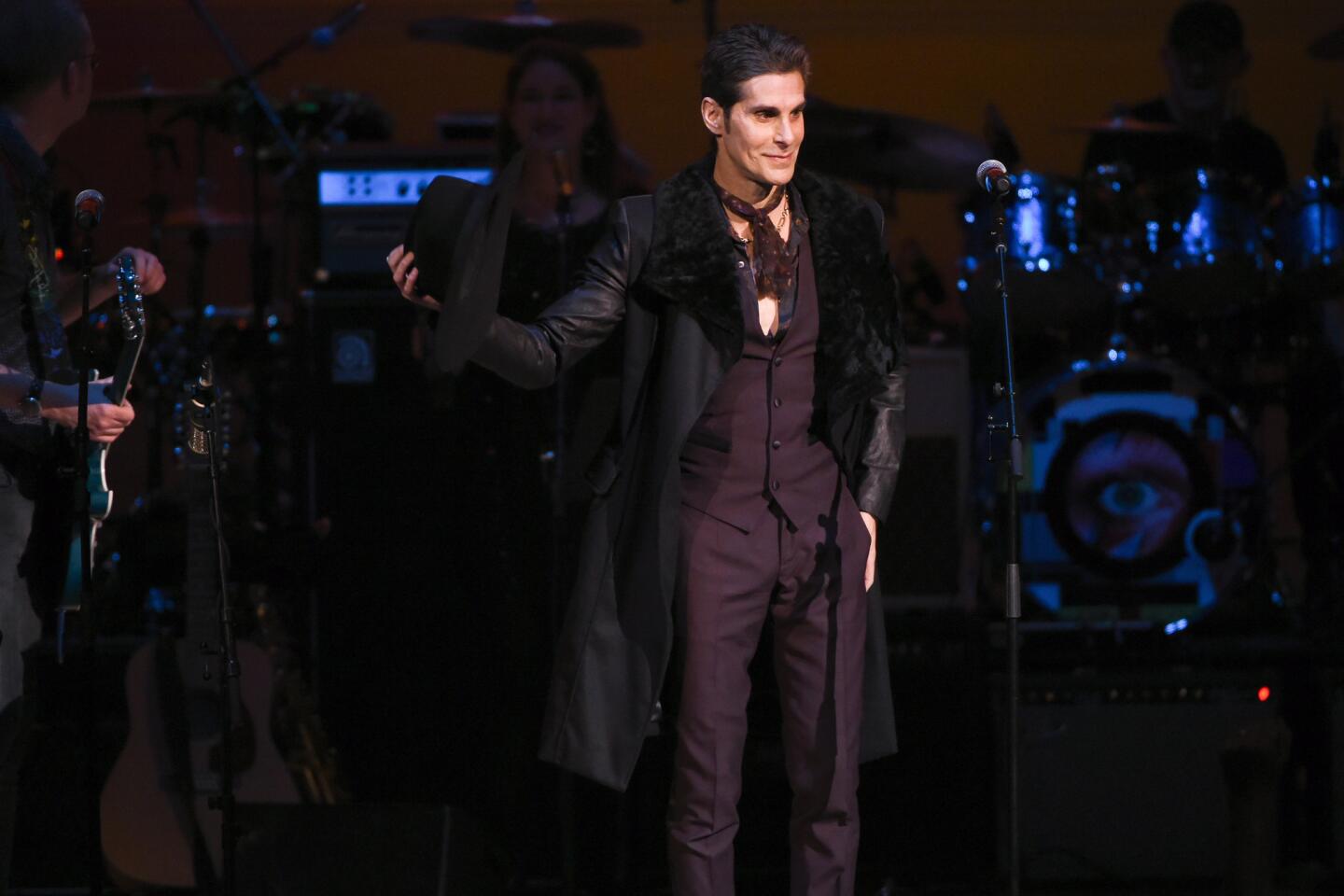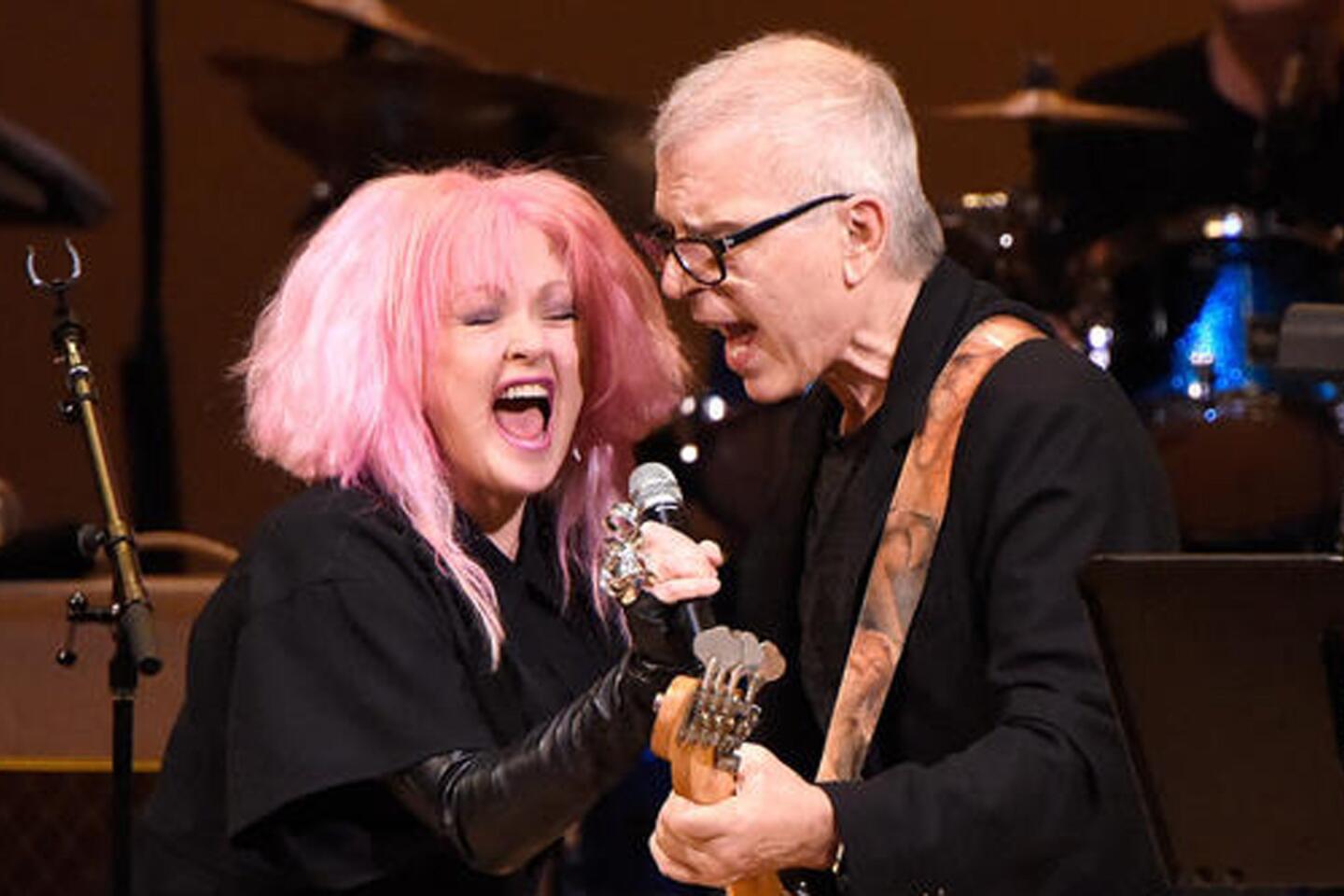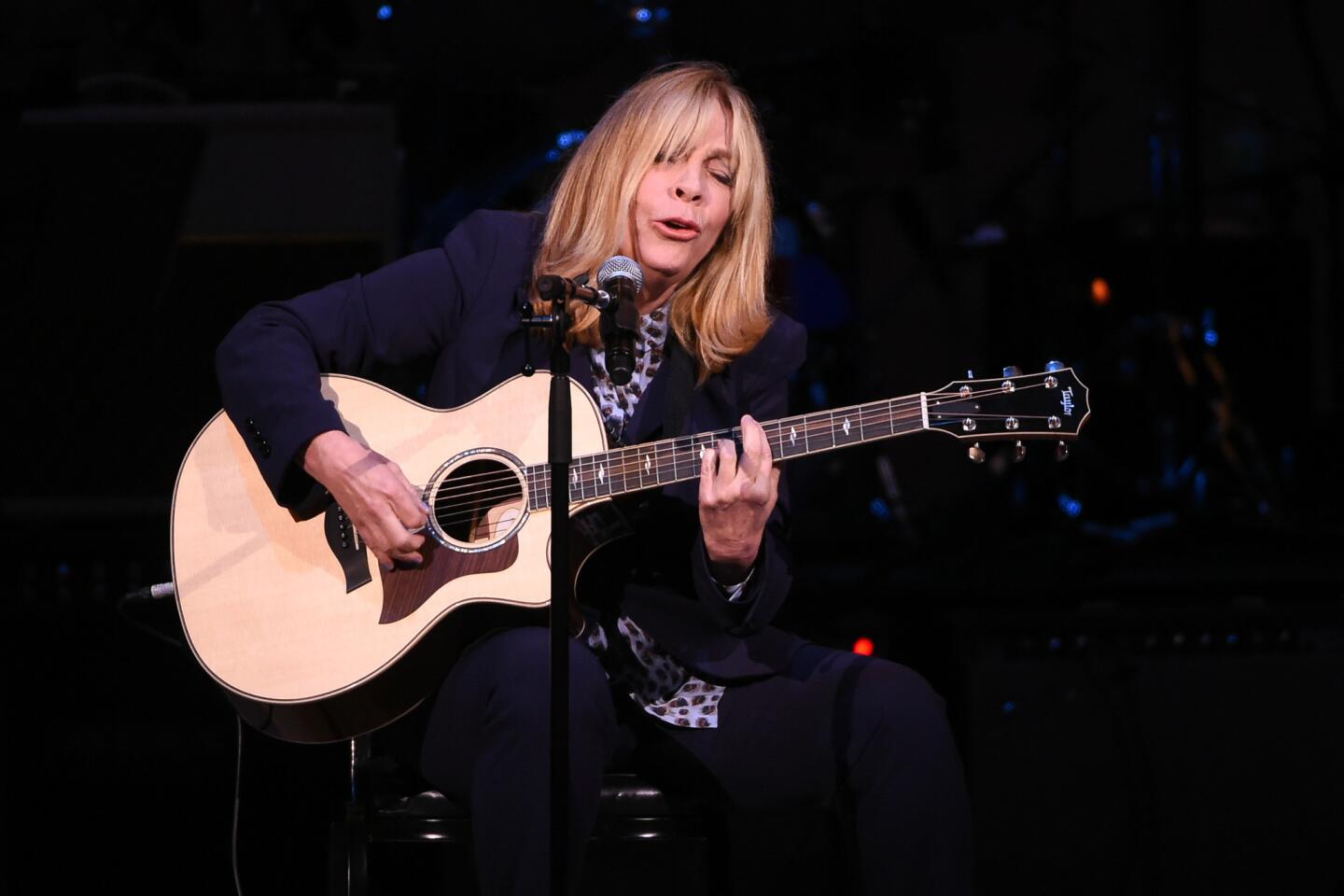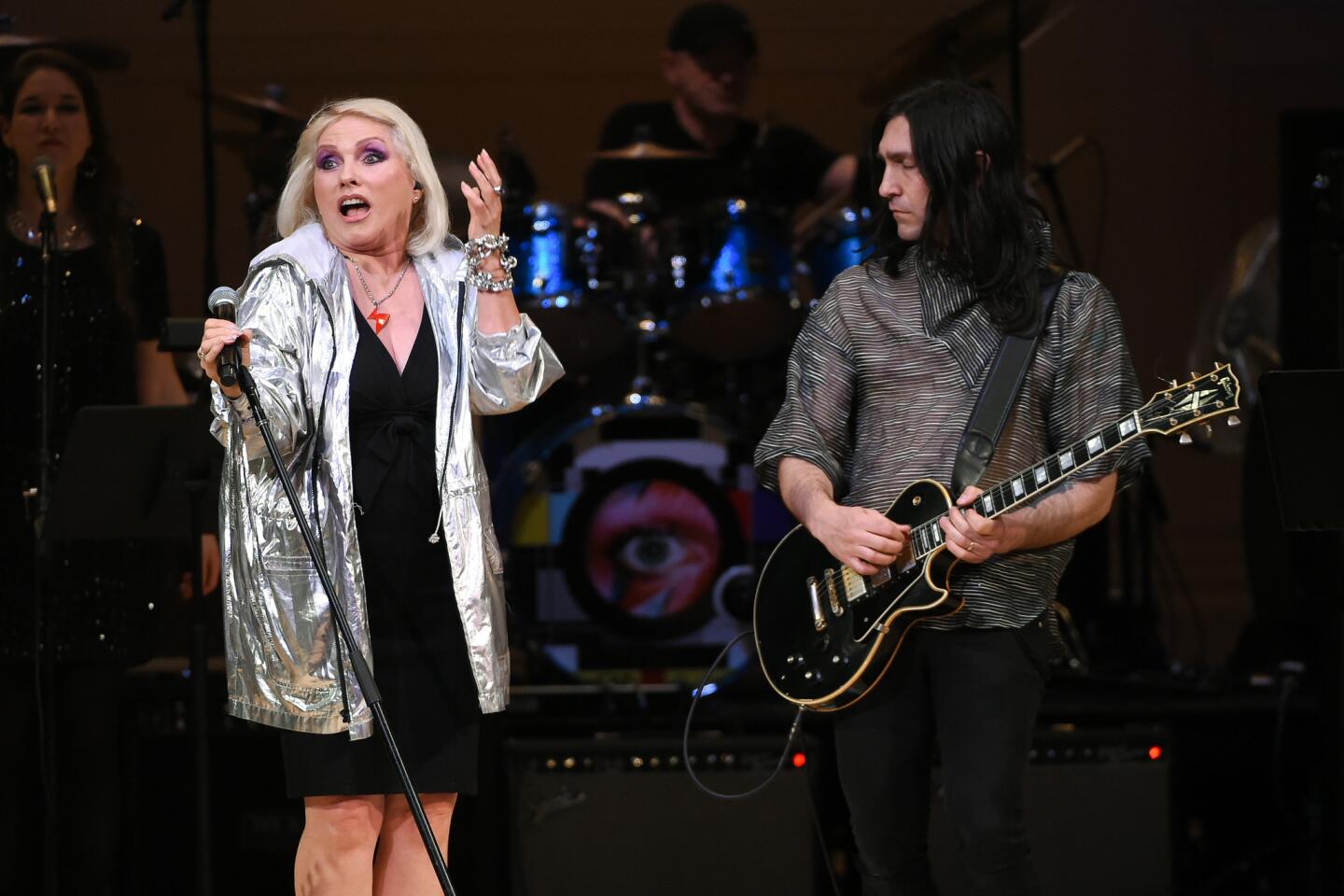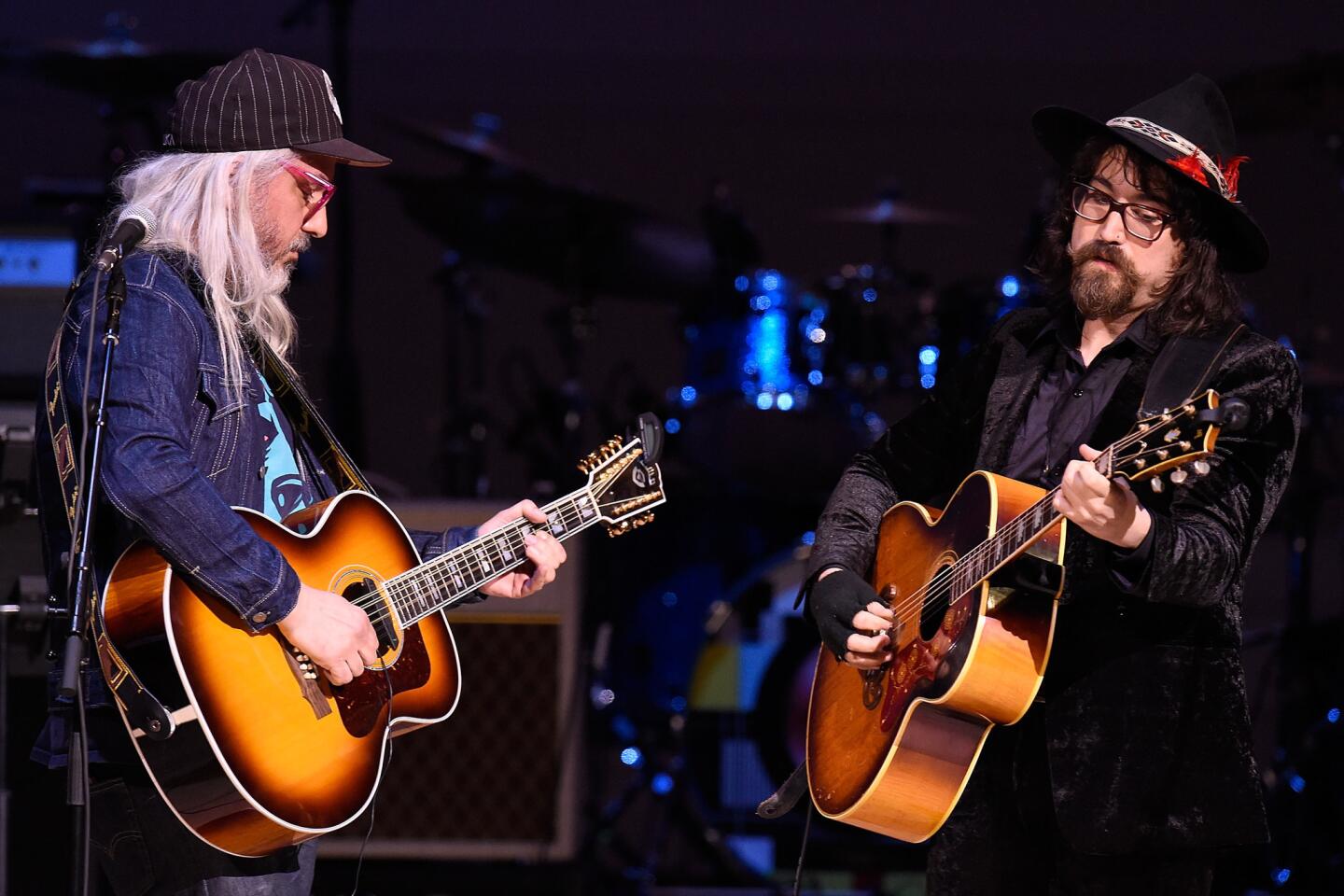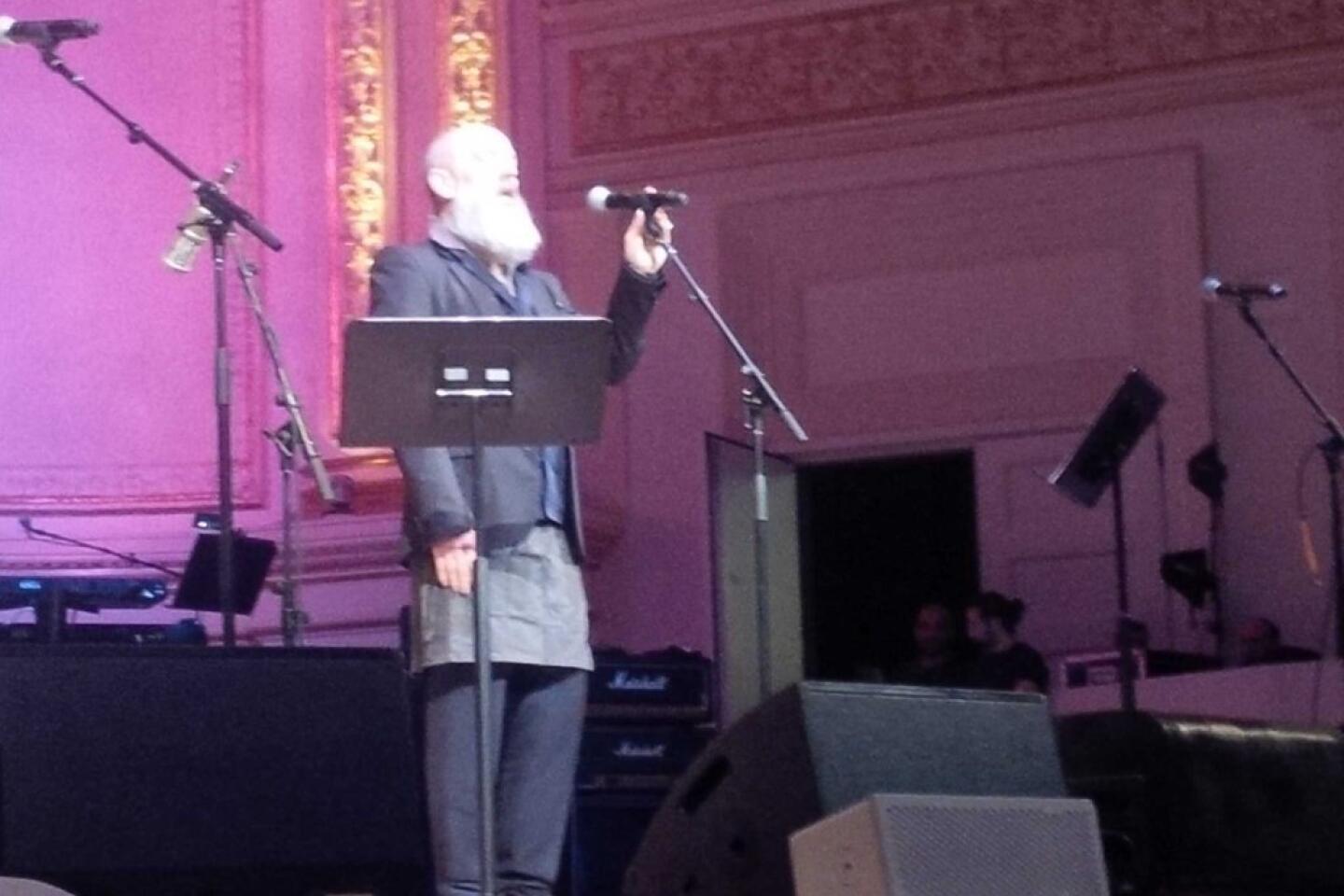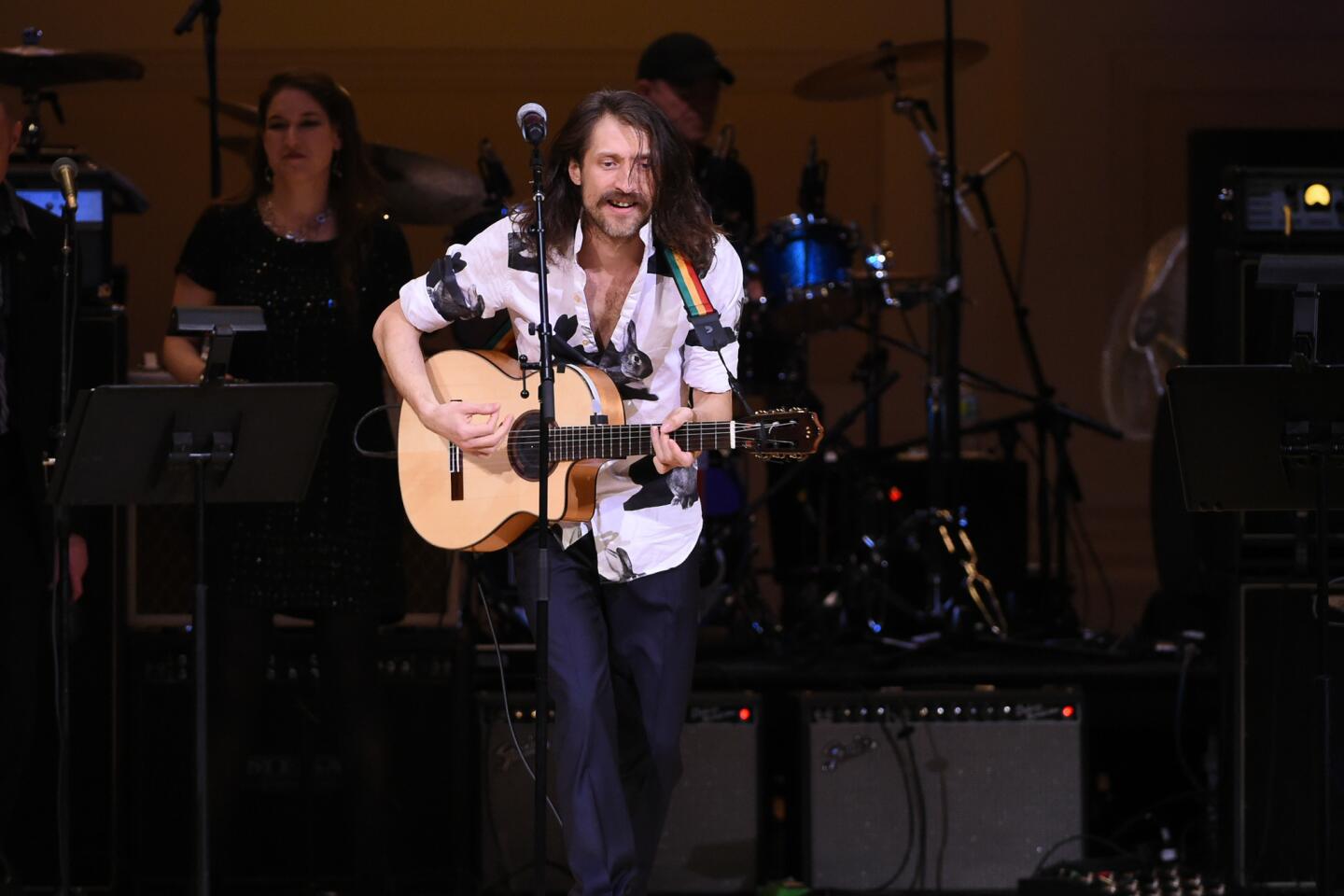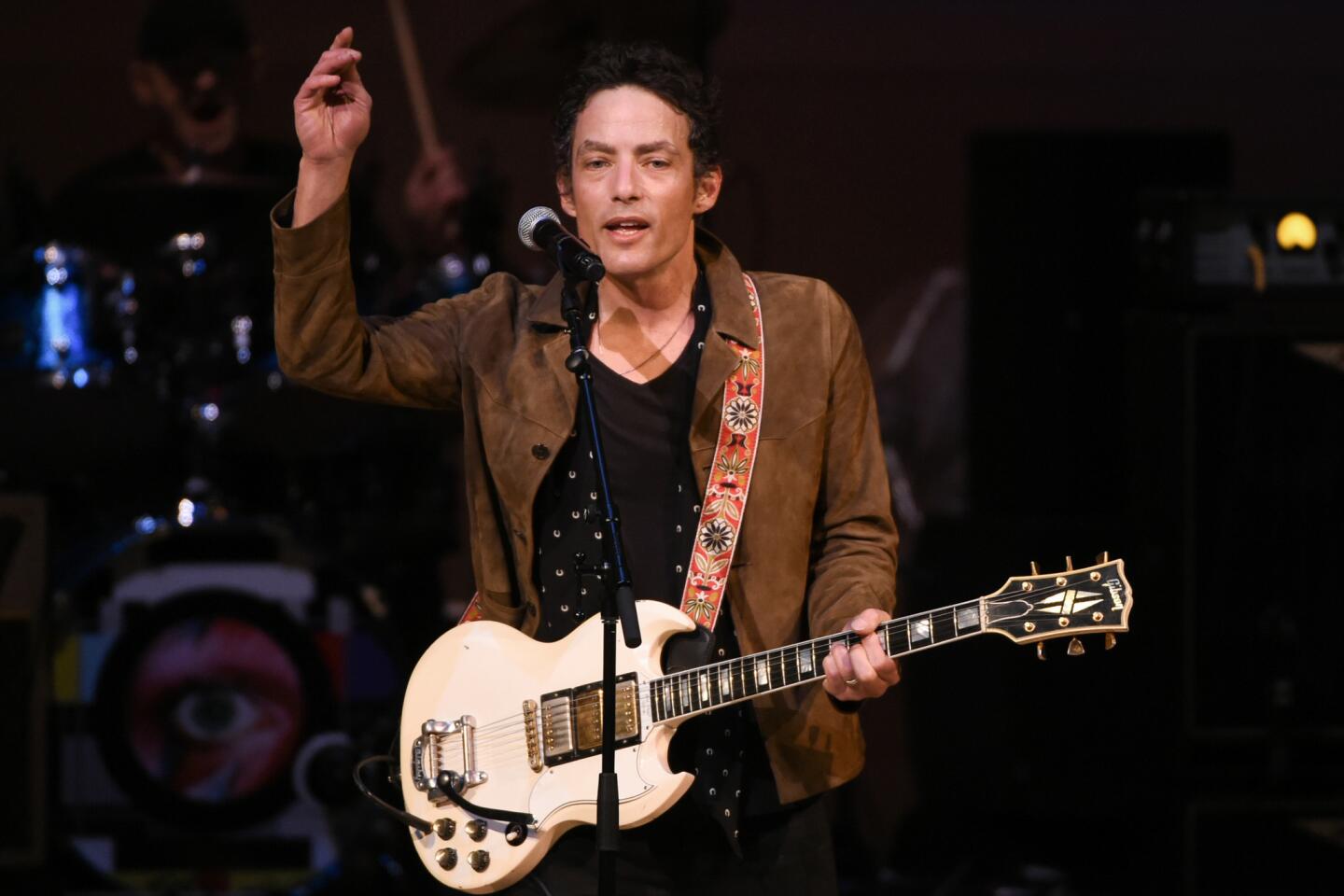Cyndi Lauper, Perry Farrell and Michael Stipe pay tribute to David Bowie in New York
- Share via
Reporting from NEW YORK — Over the course of his creative life, David Bowie wheeled nimbly between styles, tones and identities as if they were all just different parts of the same cosmic roller rink.
So it was fitting that a Carnegie Hall concert Thursday night -- the first major tribute to the rocker since his death on Jan. 10 -- featured a sprawling collection of performers and genres, even if it sometimes lacked the artistic consistency of the man it aimed to honor.
“Whether or not he’s here in this room, he’s almost certainly here in this room,” Michael Stipe said of Bowie before his number. Then he proceeded, with the help of ethereal songstress Karen Elson and a beard worthy of Andrew Weil, to perform one of the more polarizing of the show’s numbers -- a dirge-like rendition of Bowie’s addiction-minded New Wave hit “Ashes to Ashes” that meandered dolefully along the treetops, then concluded with a slow-motion interpretative dance.
Then again, Bowie was always the one telling us to put on our red shoes and dance. And he’d be the last person to try to mandate the choreography.
About two dozen performers offered their takes on Bowie songs to the enthusiastic packed house -- stylists as varied as the Flaming Lips, Robyn Hitchcock, Ann Wilson, Pixies and Rickie Lee Jones, many with the backing of HoLY HoLY, the house band led by frequent Bowie collaborator Tony Visconti. (A similar show has been added for Radio City Music Hall on Friday night.) The musicians put together a set list of either uncertain flow or charmingly grab-bag appeal, depending on your point of view -- “high-end karaoke,” as Hitchcock said in an interview after the show.
The Bowie tribute had been conceived, when the artist was still alive, by the famed New York promoter Michael Dorf as the 13th installment of an annual series. In the past, a feted musician -- including the likes of Bruce Springsteen -- would often show up to perform at night’s end. Bowie (whom Dorf had spent years wooing) may have intended on doing the same.
But the event took on a different meaning when the man who gave us Ziggy Stardust died just hours before tickets were scheduled to go on sale.
The singer’s death might have cast a melancholy mood over the evening. But in a welcome unsentimental turn befitting Bowie, few performers went for the heartstrings. Instead, most just offered a “Thank you Dave” or “God bless David Bowie” and got on with their number. (Cat Power, doing a stripped-down version of the 1972 doomsday anthem “Five Years,” pointed skyward several times.)
There were several clear miscalculations. Lee Jones’ unplugged rendition of “All The Young Dudes” wobbled and shook, unable to hit the requisite high notes. (Ian Hunter, a regular Dorf collaborator whose voice of course popularized the song, had been asked to attend but was unavailable.)
Pixies’ “Cactus” -- essentially their cover of Bowie covering them -- was a wail that began then quickly ended, squandering an opportunity for the alt-rock forerunners.
And a rendition of “The Man Who Sold The World” by the journeyman indie-rocker Joseph Arthur would have been a misfire even if Stipe had not just haunted “The Tonight Show” with his own version; even if Kurt Cobain had not rendered all other covers of the song irrelevant two decades ago; and even if Arthur had not gratuitously ended his performance by unfurling a U.S. flag with a four-letter message to Donald Trump.
But the set list, like Bowie’s grand career, frequently offered something to satisfy one constituency or another. If the show’s rhythm ebbed and flowed with all the smoothness of a blood-moon tide -- on-your-feet-dancealongs moved to laid-back snoozers and back -- one didn’t have to wait very long for an interesting take to come along.
Cyndi Lauper burst on stage, pink of hair and black of robe, for “Suffragette City,” making up with energy what she lacked in, um, lyrical fluency.
Gogol Bordello provided a rendition of the art-rock toe-tapper “Breaking Glass,” lending it a kind of Slavic mania. Bowie never had a Flying Karamazov Brothers period, but if he did, it might have looked like this.
In separate numbers, Ann Wilson and Debbie Harry each showed what’s possible when Bowie’s feminine energy is channeled through lady rockers. Wilson embarked on an unexpected “Crazy On You”-style vocal riff in “Let’s Dance” that proved one of the evening’s highlights. Harry, in a silvery rain poncho that Major Tom might have worn during a particularly intense meteor shower, brought the audience to its feet with a spirited “Starman” singalong.
Jakob Dylan supplied the most up-the-middle moment by reprising the Wallflowers’ 1998 cover of “Heroes” -- eminently listenable, even if its arena-rock polish wiped away the song’s political grit.
And Perry Farrell took the “Bowie tribute” part of the assignment the most literally -- the Jane’s Addiction pioneer slinked through “Rebel Rebel” with the tailored-suit comportment of The Thin White Duke, while sporting a hat seemingly borrowed from a production of “Wicked” down the street.
The show’s shapeshifting properties suited its protean subject.
“When you’re looking at someone like, say, Bruce Springsteen, he has a certain consistent style,” Dorf, who founded the seminal Knitting Factory as well as the current downtown venue City Winery, said in an interview after the show. “But an artist like Bowie was trying so many styles, he lends himself to a tribute with many different voices.”
Performers clearly felt that too, sometimes disassembling songs and rebuilding them anew. The R&B trailblazer Bettye LaVette remade the ’70s-rock production of Bowie’s version of “It Ain’t Easy” into a soul-blues sweetness, while John Darnielle of the Mountain Goats gave a piano-pop bounce to the spiritual desperation of “Word on a Wing.” As he belted out the lyrics -- “Lord, I kneel and offer you/My word on a wing/And I’m trying hard to fit among/Your scheme of things” -- it just as easily could have been a cry for Elton John as for the divine. (Yes, I know, same difference, to some.)
And J Mascis and Sean Lennon brought out the history-laden “Quicksand” with a whole new look. Mascis’ Dinosaur Jr. had actually covered the orchestral-flavored song 25 years ago, turning it into an alt-rock ballad. His version this time stripped down the song even further, to country, as Mascis and Lennon played the song with only two twangy guitars.
One act not present Thursday night: the Roots. Questlove announced on Instagram earlier this week that the band was pulling out of the Bowie tribute Thursday as well as the Radio City gig. The reason was an apparent dispute during rehearsal with HoLY HoLY over whether the Roots could use their drum kit.
“I’ve never been so insecure or petty as to deny a fellow musician use of ANY of my equipment,” Questlove wrote in the post. “[I]t angers me when that same courtesy is not reciprocated.”
Asked about the absence, Dorf sought to strike a conciliatory note. “I feel it’s a real shame,” he said. “This was a miscommunication during rehearsal. Egos got in the way.”
He added, “Questlove put so much work into these tributes and came up with some of the most brilliant renditions. The Roots have been extraordinary at past shows. I wished they’d come. But what can you do?”
The set ended with a choral rendition of “Space Oddity” as the audience joined in with the New York City Children’s Chorus. The sound of a Bowie classic reverberated off Carnegie’s hallowed walls, furnishing one of the night’s more goosebumpy moments. “People weren’t just singing ‘ground control to Major Tom’ — with David Bowie gone, they were saying goodbye to a whole part of their lives,” Hitchcock said.
“Because the event had a different aura tonight, I felt a responsibility with ‘Space Oddity’ that people connect,” Dorf added.
But Bowie was rarely about unadorned raw emotion in life, and the posthumous show mainly honored that spirit. More closely in keeping with Bowie’s aesthetic Thursday was not “Space Oddity” but the astral number that preceded it: the Flaming Lips’ rendition of “Life on Mars.”
“Now she walks through her sunken dream/To the seat with the clearest view,” sang the band’s flamboyant frontman, Wayne Coyne. “And she’s hooked to the silver screen/But the film is a saddening bore/ For she’s lived it ten times or more.”
The character was reaching higher, wishing for the stars, just as its writer often would. But the most Bowie-ish touch of all wasn’t the lyrics: it was the presentation. Coyne brilliantly performed the song with maximum fashion and pop-cultural elan. He wore flowing neon-lit robes, and even sat piggyback atop a fellow band member dressed to head-to toe as Chewbacca. Ziggy, we’re home.
Twitter: @ZeitchikLAT
ALSO
David Bowie, transformative musician and multi-talented artist, dies at 69
An insider’s look behind the making of David Bowie’s secretive ‘Blackstar’
David Bowie, the man who changed the (music) world
More to Read
The biggest entertainment stories
Get our big stories about Hollywood, film, television, music, arts, culture and more right in your inbox as soon as they publish.
You may occasionally receive promotional content from the Los Angeles Times.
